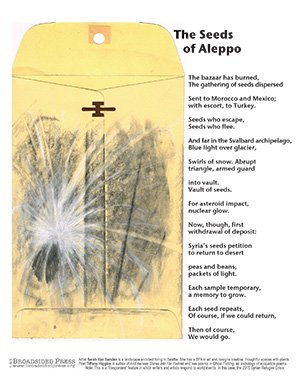In such times, a poem can seem to me of little worth.
And yet, a poem is a prayer. A prayer may be all that I can give to the Syrian people just now.
Here's my poem written for the people of Syria, "The Seeds of Aleppo." An offering as a prayer for the well being of the Syrian people.
Art by Sarah Van Sanden
The poem refers to the news last year that due to the Syrian war, it was requested to open the Svalbard (Norway) global seed vault so that Syria could in essence make the first withdrawal from the seed vault, thus underlining the gravity of the crisis in Syria.
A collaboration with artist Sarah Van Sanden, the poem appears as a broadside which you can see in better resolution and download free here. It's part of a series of art-poem responses to the Syrian crisis, and you can view the other artists' beautiful broadsides here. Thank you to Broadsided Press' Elizabeth Bradfield for publishing the broadside series.
Here's the poem without art:
The Seeds of Aleppo
The bazaar has burned,
The gathering of seeds dispersed
Sent to Morocco and Mexico;
with escort, to Turkey.
Seeds who escape,
Seeds who flee.
And far in the Svalbard archipelago,
Blue light over glacier,
Swirls of snow. Abrupt
triangle, armed guard
into vault.
Vault of seeds.
For asteroid impact,
nuclear glow.
Now, though, first
withdrawal of deposit:
Syria’s seeds petition
to return to desert
peas and beans,
packets of light.
Each sample temporary,
a memory to grow.
Each seed repeats,
Of course, if we could return,
Then of course,
We would go.











